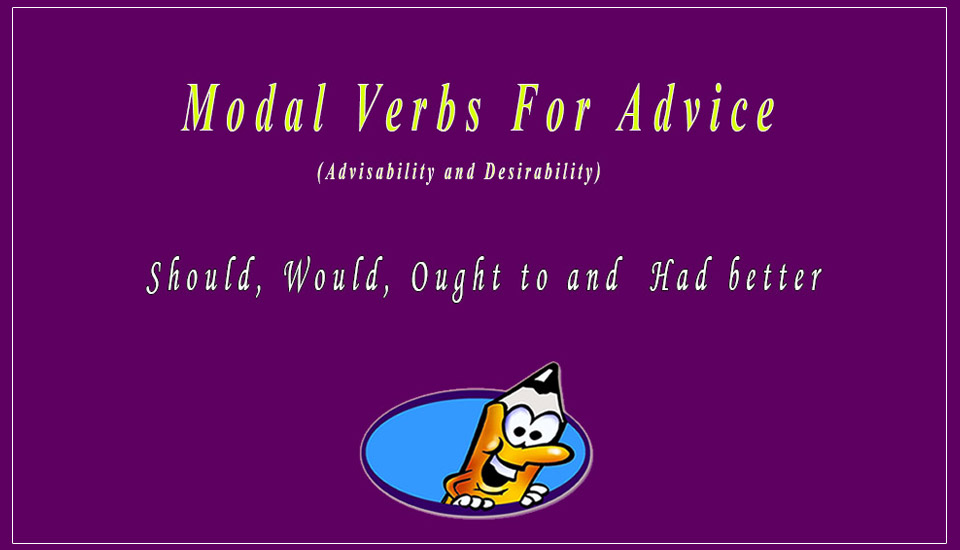There are many modal verbs in English, but we use certain modal verbs to advise someone to do something in a particular situation. In this article we will focus on Modal verbs for advice (Advisability and Desirability).

Modal Verbs For Advice (Advisability and Desirability)
We use modal verbs like should, would, ought to, and had better to give advice to someone.
Should:
Should is used for advice in the past, present or future.
Past: Should’ is the past tense of the word ‘shall.’ When using subject + should + have + past participle. ‘you are talking about something in the past that you ‘ought to’ or ‘might have’ done.
• They should have studied more for their test.
• They should have listened to their teacher.
• You should have come earlier.
Present: We use ‘subject + should + base verb’ to give advice in the present.
• You should exercise every day.
• We should eat healthy food.
• He should work hard to win the match.
Note: It is common to use ‘should’ to give negative advice. In this case, add ‘not’.
• You should not smoke.
• The children should not eat too much candy.
• You should not talk rudely to elders.
Future: We use ‘subject + should + base verb + (time reference) to advice or recommend to do something in a particular situation in the future.
• You should see the director.
• You should learn about modal verbs for advice.
• She should come on time.
Ought to:
Ought to is used to say what you advise or recommend and it means the same as should but should and had better is stronger because it implies a negative consequence if you don’t follow the advice. Another difference is that usually ought to and had better are not used with questions.
• You ought to have come to the meeting. It was interesting.
• This is delicious, you ought to try some.
• We ought to be leaving now.
Had better and had better not:
We use had better to give advice about the present or future. It is followed by the base form of the verb. The negative is had better not.
• You had better return them the money.
• You had better not forget your passport.
• They had better forgive us.
Note: We use “had better” to give advice about specific situations, not general ones. If you want to talk about general situations, you must use “should”.
• He should have been more careful.
• You should drive carefully.
When we give advice about specific situations, it is also possible to use “should”.
• You should stop worrying about it.
• Should I call him and apologize?
Would:
The modal verb “would” is used to give advice. In this situation, the speaker is giving hypothetical advice as if he/she were the listener. Consider the examples below:
• If I were you, I would buy that.
• If I were you, I would not wear that shirt.
It is not always necessary to include “If I were you”.
• I wouldn’t go to the party.
• I would study well.
Note: Normally, would is used to talk about yourself, and should is used to talk about someone else.
• I would help them if I were you.
• You should help them.
More uses of would:
Would is the past form of ‘will’, it is used to talk about the past.
• They thought they would win the final of world T2.
Would is used to talk about hypotheses – things that are imagined rather than true.
• She would look better with shorter hair.
Would is used for polite offers or invitations.
• Would you have a dinner with me on Friday?
Would is used to ask somebody politely to do something.
• Would you open the door for me, please?
We hope the article above about ‘Modal verbs for advice (Advisability and Desirability)’ would be helpful and you use these modal verbs correctly in your sentences so on.
